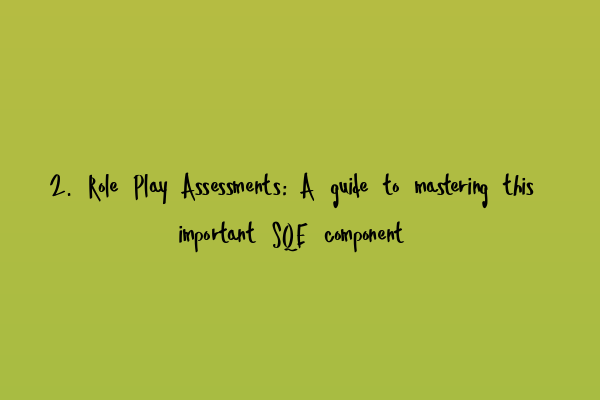Role Play Assessments: A Guide to Mastering this Important SQE Component
Welcome to our comprehensive guide on mastering role play assessments, a crucial component of the Solicitors Qualifying Examination (SQE). In this blog post, we will explore the ins and outs of role play assessments and provide valuable tips to help you excel in this important part of the exam. So, let’s dive in!
Understanding Role Play Assessments
Role play assessments are designed to test your ability to apply your legal knowledge and skills in realistic scenarios. These assessments simulate the type of interactions you may experience in a legal practice, allowing you to demonstrate your competency in practical situations. It assesses your ability to think on your feet, communicate effectively, and apply legal principles to solve problems.
During the role play assessments, you will be presented with a fictional client or colleague and a specific scenario. You will need to engage in a conversation or negotiation with the client or colleague, demonstrating your ability to analyze the situation, ask relevant questions, provide advice, and address any concerns or queries effectively.
These assessments are typically video-recorded, allowing the examiners to assess your performance in detail and provide feedback on your strengths and areas for improvement. Role play assessments require strong communication skills, legal knowledge, problem-solving abilities, and empathy.
Preparing for Role Play Assessments
To master role play assessments, thorough preparation is key. Here are some essential tips to help you prepare:
- Focus on legal principles: Understand the key legal principles and concepts relevant to the scenarios you may encounter. This will allow you to provide accurate and informed advice during the assessment.
- Practice active listening: Effective communication is vital in role play assessments. Practice active listening skills to ensure you understand the client’s or colleague’s concerns and can respond appropriately.
- Develop problem-solving skills: Role play assessments often involve resolving complex legal issues. Enhance your problem-solving skills by practicing scenarios with varying levels of difficulty.
- Build empathy: Developing empathy towards the client or colleague you are interacting with can greatly improve your performance. Put yourself in their shoes to better understand their concerns and provide appropriate advice.
- Utilize practice resources: Access SQE sample papers and practice materials to familiarize yourself with the format and style of role play assessments. This will help you become more comfortable and confident during the actual exam.
For additional guidance on preparing for the SQE, we recommend checking out these related articles:
- Conquer the Multiple Choice Questions (MCQ) in SQE1
- SQE Sample Papers: Practice for Exam Success
- Focus Areas in SQE1 and SQE2: Mastering Key Concepts
- Adjusting Your SQE Strategy Based on Mock Performance
- SQE Mock Debrief Sessions: Critical Steps for Improvement
During the Role Play Assessment
On the day of the assessment, it’s important to remain calm, focused, and confident. Here are some tips to help you perform your best:
- Read the instructions carefully: Before starting the assessment, read the instructions and scenario details thoroughly. Understanding the requirements and objectives will help you respond effectively.
- Manage your time: Role play assessments are time-limited, so manage your time wisely. Allocate sufficient time for questioning, analyzing the scenario, and providing advice.
- Speak clearly and confidently: Effective communication is key in role play assessments. Speak clearly, express your thoughts confidently, and maintain a professional demeanor throughout.
- Ask relevant questions: To gain a comprehensive understanding of the situation, ask relevant and probing questions. This will allow you to provide accurate and tailored advice.
- Be adaptable and flexible: Role play assessments often involve unexpected twists and turns. Be flexible and adapt to changes within the scenario, demonstrating your ability to think on your feet.
Post-Assessment Analysis
After the role play assessment, take the time to reflect on your performance and identify areas for improvement. Consider seeking feedback from your tutors or supervisors to gain valuable insights.
Remember that perfection is not expected in role play assessments. It’s more about demonstrating your abilities, applying legal knowledge effectively, and showing professionalism in your interactions.
By following these tips and utilizing the provided resources, you’ll be well on your way to mastering the role play assessments in the SQE. Good luck with your preparations!
